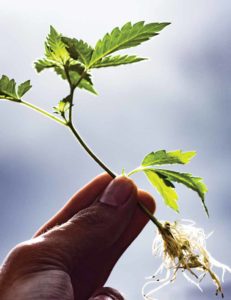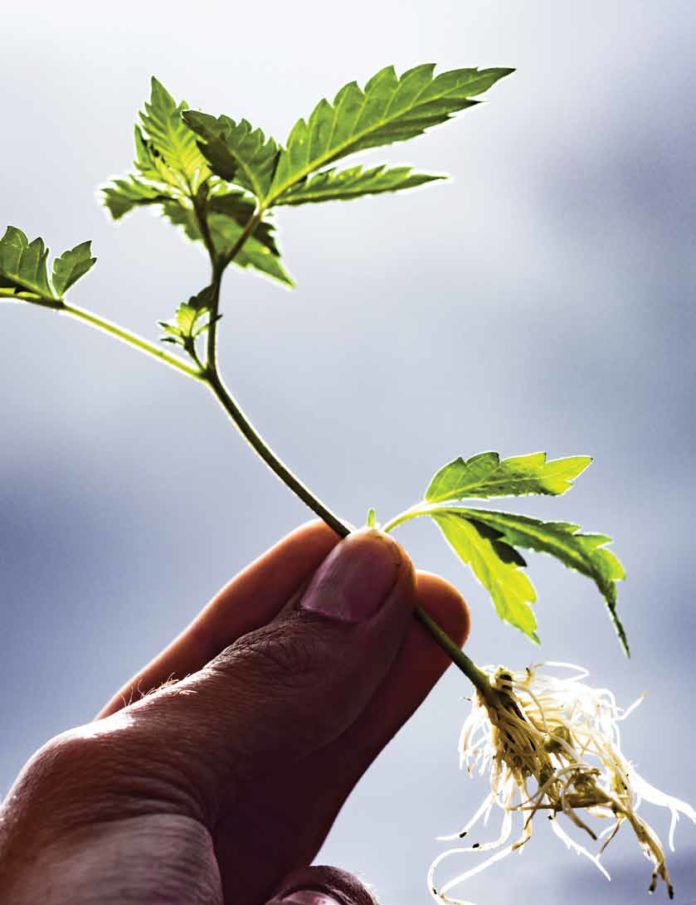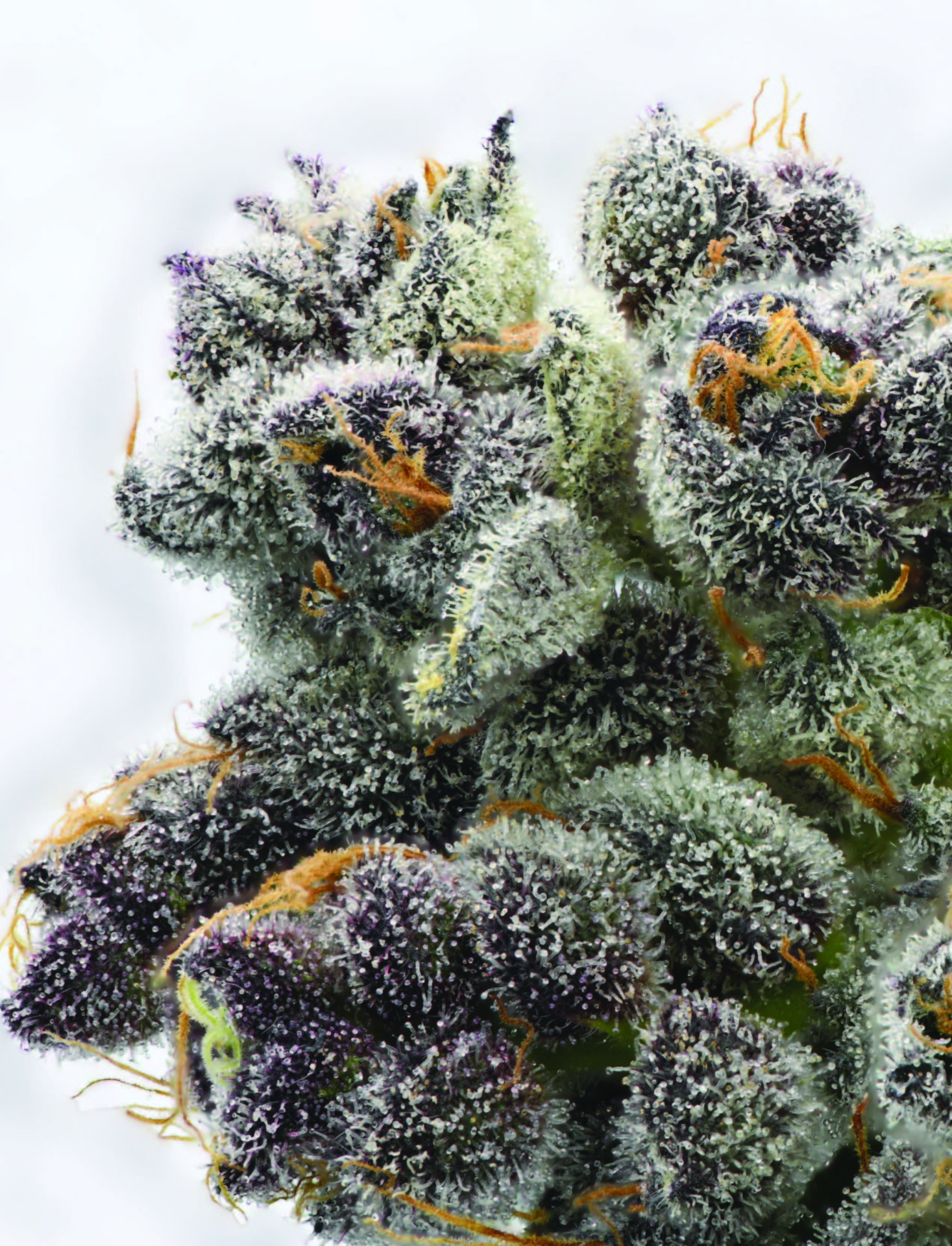
By Nickolaus J. Sanchez
When you first start gardening, germinating seeds and cloning plants can be very
discouraging. Whether your seeds aren’t popping or your clones aren’t rooting,
it all can be frustrating. However with the proper technique you should be
a pro in no time!
One of the first things to note is that cannabis
is a dioecious plant, meaning it contains only a
male or female plant. The male produces pollen
and the female produces seed. Of course,
the female will only produce her seed if she is
pollenated by the male. As patients, we want
the female plant because the flower is what
produces the medicine. For the highest quality
flower we want what they call, “sinsemilla” flowers,
meaning “without seeds.” Absolutely NO
males allowed. This is a women’s den!
So which do you start with, the clone or the
seed? Let me explain.
Clones
A clone is a genetically identical cutting from
a parent plant. All offspring will be identical to
the plant they were cut from, this means it has
a 100% chance of being female. This will save
stress and labor for you, as you won’t have to
constantly check for males that could pollenate
your grow room. Also, considering that
the cuts are from mature, developed plants,
you will be set a couple of weeks ahead of the
regular grow time. However, like everything
there are also disadvantages to using clones.
For instance, when you are cutting from another
plant, if that plant has health issues, this
increases the chances of getting pests and
pathogens. Additionally, when you first start
growing, finding clones can be difficult considering
you do not have a parent plant to begin
the process. Once you have the mother to
clone, this recipe will explain how to clone it:
How to Clone
Tools Needed: Clone Solution, Razor Blade,
Sanitized Gloves, Clone Dome, Purified Water,
Rockwool Cubes, Mother Plant, Spray Bottle.
Start by wearing gloves and sanitizing all tools
and the work station to decrease your chances
of getting pests or pathogens. Next, sit your
rock wool cubes in the water. The rock wool is
what your clone will sit in after being cut. Once
all the rock wool cubes are nice and wet – not
soaked – it is time to choose a healthy mother
plant to cut. Remember
she is going
to supply your whole
crop, so she should
be as healthy as
possible!
Now that your work
area is prepped you
are ready to cut
your clones. When
cutting the clones
remember to cut at
a 45 degree angle
to create a point in
the stem. I suggest taking from the top of the
plant (the newest growth) because they are
less prone to pests and pathogens. The cut
should be at least 5″ tall.
Once you have taken your cut, clean off all
growth with the razor until you have only two
nodes (sections of growth) left at the top. From
here simply dip your cut into your choice of
clone solution and then gently place the stem
in the pre-poked hole of the rock wool cube
about 1″-2″ deep. Lastly, place your finished
cutting into the clone dome. Before you seal
the dome be sure to spray the tray, lid, and
plants with purified water to create a humid
environment. An adequate humidity is approximately
60%-80% with a temperature of 80
degrees. This will promote fast root development
within 7-10 days. Be sure to spray everyday
at least twice a day and check cubes for
moisture. After clones have fully rooted, you
can plant your clones into your choice of soil
and start growing.
Seeds
These days the average grower will use clones
for convenience but if done properly, growing
from seed can have a great number of advantages.
One of the biggest ad- vantages is
that they have a primary root called taproot,
which makes them more vigorous growers.
This can result in a healthier plant with a higher
yield. Another advantage to using seeds over
clones is that it is more natural to the plant
itself because cannabis is an annual plant
(grows for only one season) so it’s just simply
not genetically engineered to have such a
prolonged life as a clone.
Just like the clones, seeds have their fair share
of disadvantages as well. For example, because
you don’t have any growth to start with,
like the clones, you don’t have a jumpstart.
Also, if you don’t purchase feminized seeds
(99% female dominant) 50% of your plants will
be males. Not only will you have wasted half of
your money but this also means you will have
to rummage through and uproot all males.
Below is written tools needed and instructions
on how to germinate your seed.
How to germinate
Tools Needed: Seeds, Paper Towels, Purified
Water, Two Paper Plates, Gloves.
Start with sanitizing all tools and work station to
decrease your chance of pests or pathogens.
Once your work area is sanitized, you will want
to overlap two paper towels, fold them down
three times and then open them back up.
Now, place the separated seeds, in the middle
of the two overlapped but unfolded paper
towels. Fold them back up and be sure the
seeds don’t fall out. After your seeds are nice
and secure, wet the paper towels and seeds
with the purified water. The paper towel should
be wet but not dripping. Lastly, place the wet
paper towels on one of the paper plates and
place the other plate on top, upside down to
create a dark dome. Store plates in a dark,
room temperature area. After 2-4 days seeds
should have a baby white root and ready to
be transplanted into your growing medium.


















